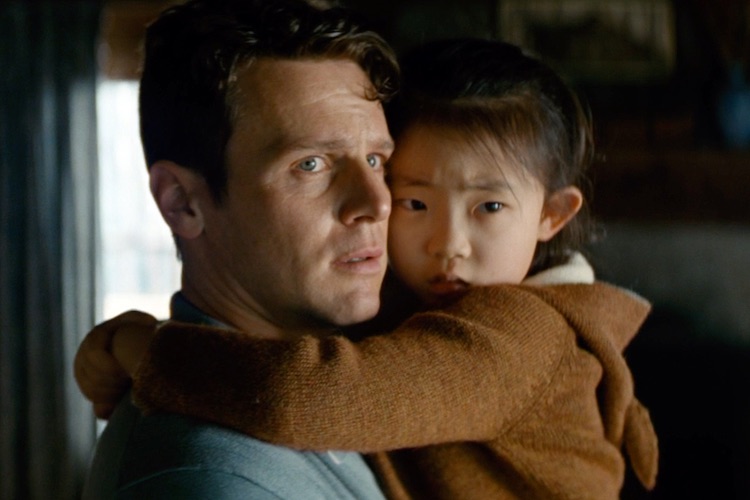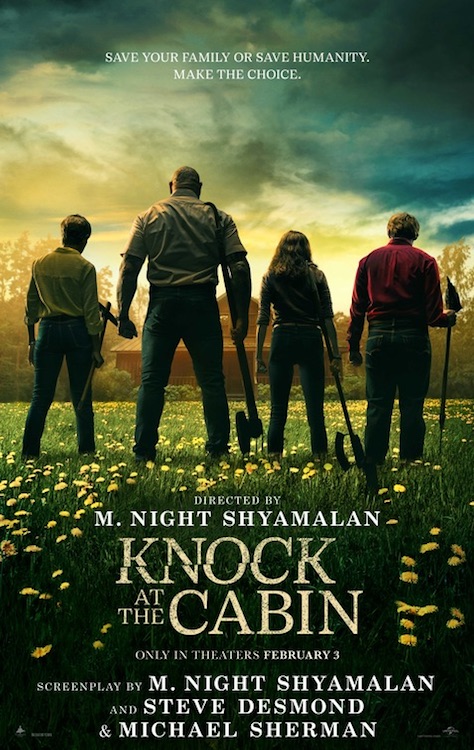
Movie Review: Knock at the Cabin
What We Liked
What We Didn't Like
Continuing the career resurgence that began with 2015’s The Visit, M. Night Shyamalan delivers once again with Knock at the Cabin. The claustrophobic horror-thriller mixes intensity and spiritual paranoia, resulting in the director’s most assured film since Split (2016).
Based on Paul Tremblay’s novel The Cabin at the End of the World, the film is Frailty (2001) by way of The Strangers (2008). Eric (Jonathan Groff) and Andrew (Ben Aldrige) are vacationing at a secluded cottage with their 7-year-old daughter Wen (Kristen Cui) when four strangers break into their cabin and proceed to hold them hostage. Their leader, Leonard (Dave Bautista), tells the family that he and the others have had visions of the apocalypse, and the only way to save humanity is for the family to choose to sacrifice one of their own.
Shyamalan – working from a script he co-wrote with Steve Desmond and Michael Sherman – draws tension not only from the physical threat but also its emotional and mental subtext. Andrew was the victim of a hate crime and believes the strangers are bigots intent on terrorizing them. Eric still holds a tenuous grasp on his faith, and a concussion sustained in the intrusion keeps him from thinking clearly. And what are we to make of the strangers’ violent rituals and the disasters reported on the news shortly after they arrive – is it coincidence, or is there some truth to their terrible prophecies?
Shyamalan doesn’t present Leonard and his cohorts as menacing villains. Bautista’s an imposing figure, but Leonard is soft-spoken and gentle, his voice maintaining a measured tone at all times. Likewise, his associates are by turns empathetic and kind, almost apologetic; I particularly liked Abby Quinn’s nervous energy, and the competency and gentleness shown by Nikki Amuka-Bird as a nurse turned kidnapper. Only Rupert Grint’s growling redneck character is particularly antagonistic, although there are hints that he’s tried to make amends for any previous misdeeds. It upends the usual home invasion formula; the strangers’ anxious charm and concern for their captives is almost more unsettling than any overt intimidation.
Aldridge and Groff create a compelling and sympathetic couple. Brief flashbacks to their conflicts with parents, arguments about religion, reactions to trauma, and struggle to adopt Wen create a strong relationship at the film’s core and provide understanding for why the two have such diverse reactions to the situation at hand. Both are strong actors, and create a moving portrait of a family struggling to maintain solidarity under unimaginable circumstances.

Jonathan Groff and Kristen Cui in “Knock at the Cabin.” Credit: Universal Pictures/YouTube
Shyamalan has long proven he can direct actors to some of their best performances, and Bautista hits a career high. While he’s asked to lean into his physicality for most roles, the former wrestler counters that with a vulnerability and almost heartbreaking sense of empathy. From the moment he’s introduced catching grasshoppers with Wen, there’s a kindness and heart-brokenness that radiates from him, which clashes with the character’s horrific duty. It’s the strongest part of an already strong ensemble.
It’s almost required to talk about Shyamalan’s career ups and downs in these reviews. He’s still a long way from the patience and visual creativity he displayed in the stretch between The Sixth Sense (1999) and The Village (2004), but Knock at the Cabin feels closer in tone to those earlier works. He’s once again focused on the tension between the supposedly rational and the supernatural, the bond between families, and reactions to trauma. He’s since dropped the guise of considering himself the world’s greatest filmmaker, and leans into his role as a master of horror. From the vintage Universal logo that opens the film through its haunting opening credits scene, he creates a palpable sense of dread and manages to sustain the terror through much of the film. It’s relatively light on blood for an R-rated work– Shyamalan cuts away before most of the violence is shown – but he has a knack for exquisitely ratcheting the tension, and several images are among the most haunting in his filmography (a shot involving an only slightly transparent white mask is particularly unsettling). There are also sequences – including a breathless rush to a gun – that keep the suspense thrumming.
For most of its runtime, Knock at the Cabin sticks closely to Tremblay’s novel and the ever-growing tension between captors and captives, and the blurring line between rationality and religious fervor. In its final 15 minutes, Shyamalan throws out the ambiguity in favor of something more concrete. It loses the despair and nihilism of Tremblay’s work in favor of a more bittersweet, quietly hopeful, ending. The difference isn’t bad in theory – there’s no way a major studio would release a film that goes as dark as Tremblay’s novel – but its execution is clumsy. The script over-explains symbols the audience has already decoded and awkwardly introduces new thematic concerns, which are rushed through in overwritten dialogue between Aldridge and Groff. As he did with Old (2021) and Glass (2019), Shyamalan can’t help but draw out the finale with a series of reveals and scenes that try to bring closure to a narrative that would have been much more unsettling and effective were it left open-ended.
It’s a shame, because a stronger ending could have made Knock at the Cabin one of Shyamalan’s best works. As it is, it’s a mostly effective thriller with ideas worth chewing on; it should have just kicked the audience out of the cabin before explaining itself.



